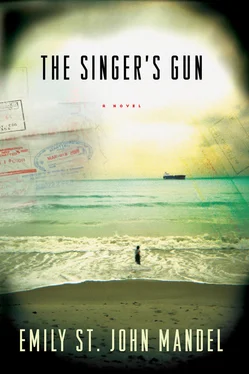“How did you come here?” he asks her. It’s a question he’s been asking almost everyone lately. Their stories are seldom uninteresting. He has half-baked ideas about writing something someday — working title: A Totally Fictional Guide to Immigrating Illegally to New York —and to this end he’s been taking some notes in the evenings.
“In a box,” Natalka says. “I came here in a box.” She lights a new cigarette with shaking hands, and lifts it quickly to her lips. She’s gone pale; her smile has vanished; he presses her no further. And it’s only several years later, holding a pay-phone receiver to his face on the island of Ischia, that he understands what she meant.
“Shipping containers. It’s shipping containers, isn’t it?”
“Bright boy,” said Aria.
“Do you know what happened to her?”
“To Natalka? No idea. She put me in touch with the people who imported her in exchange for a discount on her passport, and that was the last time I spoke with the girl.”
“I don’t think it’s right.”
“No,” she said, “of course you don’t.”
“Aria, you know what happens to girls like that.”
“All of them? Anton, grow up. It’s a way of entering the country. What would their lives be like, in these places they come from? These radioactive little Ukrainian towns, Anton, these dark little villages without jobs, these fallen-down countries where everything’s corrupt? It isn’t that there’s no industry in these places, it’s that they are the industry in these places. They can be strippers and call girls there or strippers and call girls here, and here at least they stand a chance. When you think about it, Anton, do you disagree with me?”
“No,” he said after a moment. “I don’t disagree with you.”
“Besides, you’re helping a friend.”
“You’re many things to me, Aria, but friend isn’t exactly—”
“No,” she said, “I mean you know someone who’s arriving on the next boat.”
“What? Who?”
“Ilieva went back to Russia two months ago. Her grandmother was dying and she wanted to see her, but then she couldn’t get a visa to come back to the United States and she got stuck over there. Think of everything she’s done for us over the years.”
“She’s done a lot.”
“So do something for her. Go downstairs to the restaurant tonight, and give the FedEx envelope to the men who are bringing her back to New York. The interaction’s over in five minutes, and you’re done. Ilieva’s boat moves unmolested into the port at Red Hook. The shipping container is driven away and unloaded, and she’s back in New York on Monday morning. You can come home tomorrow, make up a story for Sophie about a nervous breakdown or something, and life resumes its former course.”
“And life resumes its former course,” he said. He was watching Elena. After they’d made love in the hotel room and slept for a while she had wanted to go swimming, and he’d left her to change while he came down to call Aria. Now Elena was crossing the piazza barefoot, wrapped in a towel and headed for the beach. “Why does she have to come back in a shipping container? Couldn’t you have just sent her a passport?”
“There wasn’t time. She told me she was in some kind of trouble. She wanted to get out of Russia quickly and it was the best I could do on short notice.”
“Aria, promise me you’ll leave me alone after this.”
“This is the last job I’ll ever ask you to do.”
Elena stepped out of sight along the beach.
“Do you remember that night,” he said, “when we were fourteen and I cut your hair in your bedroom?”
She was quiet for a moment. “Why?”
“I don’t know. I was just thinking about it today. There was a certain time in our lives when we didn’t have to become so. . well, so adversarial, for lack of a better word.”
“I don’t consider you an enemy,” Aria said.
“What do you consider me, then?”
“Listen,” she said, “I’d love to stay on the line and talk, but I have things to do. It’s just business, Anton. Remember that.”
“Just business,” he repeated.
“Goodbye, Anton,” Aria said, and she disconnected before he could respond. He hung up the phone and followed after Elena.
She was in the water. He watched from the beach while she swam out to the breakwater, pale and full of grace. She swam beautifully. She climbed up onto the breakwater rocks, turned and waved at him. That was the moment when he knew; he saw the slight swell of her body when she turned toward him, the weight of her breasts when she raised her arm, and he understood why she had come to him.
“Oh my God,” he said, aloud. Elena turned her back on him to look out toward Capri, a small hopelessly erotic figure with his shorts clinging wet around her legs (she’d brought no swimsuit from New York), and the feeling of falling in love was literal: a fall, handholds breaking away in the descent. She swam back to him and he wrapped her in a towel. She sat curled up tight against his side, not quite shivering but not quite warm either, and he held her close with his arm around her shoulders. While she was out at sea he had taken off his wedding ring. Now he buried it with his free hand, pushing it as deep as it would go into the sand.
Ilieva moving over the ocean:
It is dark, but dark isn’t a strong enough word. It is ink, purest black, purest absence-of-light. The air is dense and still. There are fifteen girls in a small room squared out of the middle of a shipping container. They sit shoulder-to-shoulder with their backs to the walls, as they have since the ship left Lithuania. If you want to lie down you have to move to the center, but they can’t all lie down at once, there isn’t room, so they often fall asleep sitting upright and wake up disoriented with numb legs and painful backs. Time comes to a standstill. They long for fresh air. The ship is so enormous that they feel no movement of waves; there is only a faint steady vibration of engines that surrounds them in their metal room. Their imagined lives in America are heady and bright but when they drift off to sleep with their backs to the walls they have nightmares. It’s sometimes hard to tell the difference between being awake and being asleep.
The captain lets them out at intervals, when it’s safe, but the intervals are too rare and the claustrophobia is pure agony. There’s a girl from Kiev who will do nothing but sit in the corner and weep. The others try to comfort her, but none of them happen to speak Ukrainian and the girl from Kiev speaks neither Russian nor English. Ilieva closes her eyes in the stifling darkness and thinks the same thought over and over again: I will never go home again. She draws her knees to her chest and tries to vanish into memories. The girl from Kiev sobs once beside her, and Ilieva takes her hand. The hand is hot and fevered, and the girl is shaking. She’s sick and has been for days now. She won’t eat or drink. She whispers something through her tears.
“I’m sorry,” Ilieva murmurs, in Russian and then in English. “I don’t speak Ukrainian. I don’t understand.”
But the girl keeps whispering, and after a while Ilieva does understand her, even though the girl’s delirious, even though they have no language in common. I miss my family. I am so afraid. It takes so much to come here, and I’ve left so much behind.
“Where did you come from?” David asked in the evening.
Elena had been on Ischia for less than six hours, and she’d slept for a while and gone swimming. Now she sat with Anton and David on the piazza, eating pizza, and Anton had his arm over her shoulders. Over the past few days the breeze from the sea had grown cooler. One or two other stragglers from the tourist season were inside the restaurant, but no one else sat outside. A waiter had come around and placed a candle on the table, and David seemed ill at ease and restless in the flickering light.
Читать дальше





![Ричард Деминг - Whistle Past the Graveyard [= Give the Girl a Gun]](/books/412176/richard-deming-whistle-past-the-graveyard-give-t-thumb.webp)






